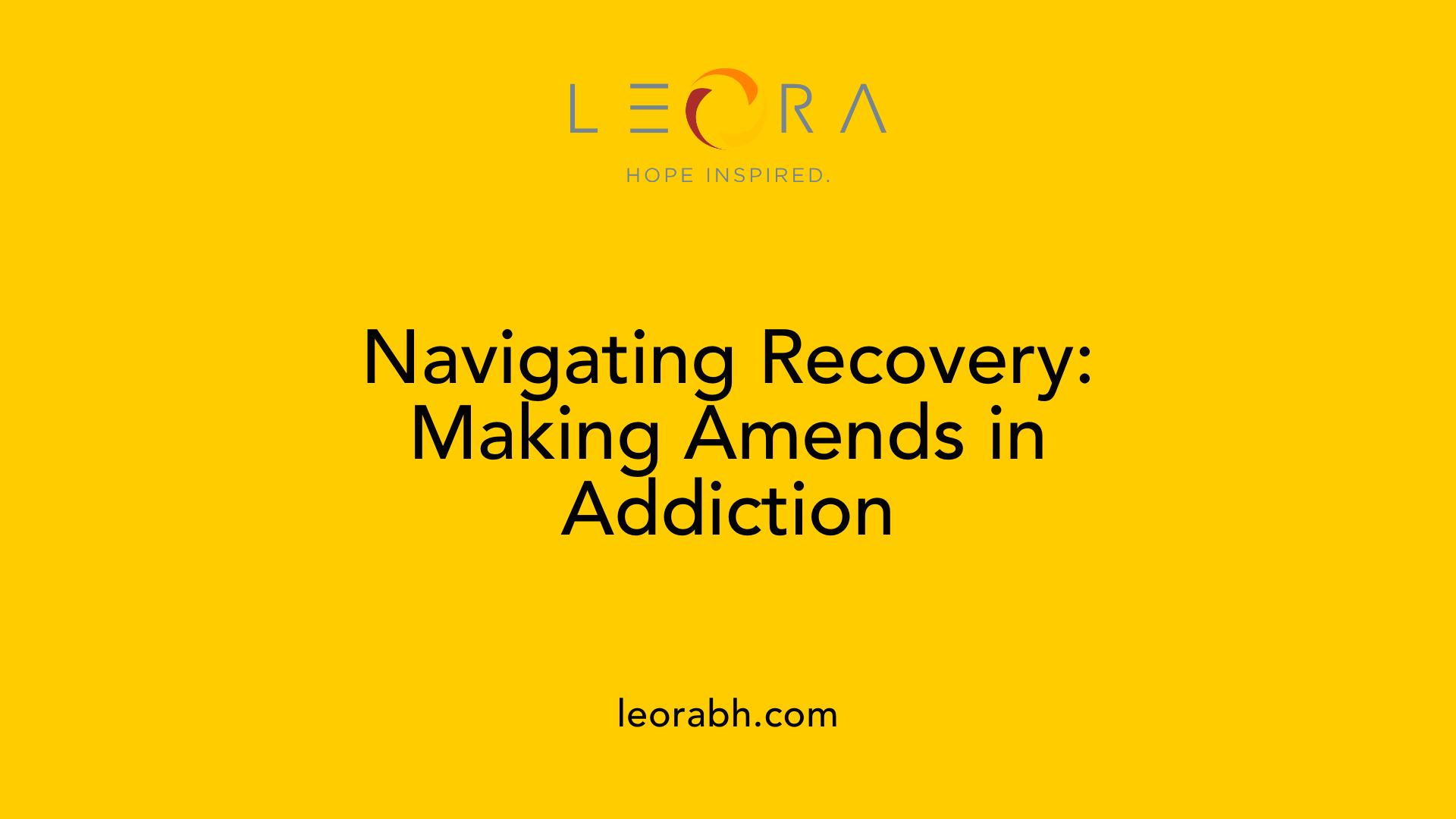How to Make Amends and Repair Relationships in Recovery
Navigating the Path Towards Healing Relationships in Recovery
Understanding the Role of Amends in Recovery
In the journey of addiction recovery, the task of mending broken relationships becomes a fundamental but daunting challenge. Making amends is a pivotal action that extends beyond mere apologies, requiring substantive efforts to repair the damage caused by addiction. It serves as a crucial step in the Twelve Step recovery process, particularly emphasized in the Alcoholics Anonymous framework. This article delves into the importance of making amends in recovery, offering insights into the process, emotional implications, challenges, and strategies for effectively restoring trust and fostering healthier relationships.
The True Meaning of Making Amends

How does making amends differ from simply apologizing?
Making amends goes beyond simply offering an apology by actively taking steps to repair the harm caused. An apology may express regret but making amends requires acknowledging the pain inflicted and addressing it in a meaningful way. This can involve restitution, such as compensating the affected party, or implementing behavioral changes to prevent future occurrences.
Role of restitution and behavioral change
Restitution plays a vital role in the amends process. When individuals acknowledge their past wrongdoings, they often seek ways to make things right, be it returning stolen money or taking actions that reflect a commitment to change. Additionally, behavioral change is crucial; it shows that the person is serious about healing and rebuilding trust. Adopting a lifestyle aligned with recovery principles manifests tangible change, enhancing the effectiveness of the amends made.
Importance of empathy in amends
Empathy is foundational to making amends. Understanding and validating the feelings of those harmed fosters open communication and demonstrates genuine remorse. Individuals should approach those affected with respect, ensuring that their reactions and needs are prioritized. Mutual efforts towards healing underscore the commitment to change and long-lasting recovery, making empathy not just important, but essential in the journey of mending relationships.
Understanding the Amends Process in Recovery

What is the process of making amends in addiction recovery?
The process of making amends in addiction recovery is a critical step that involves acknowledging the harm caused to others, taking responsibility for one’s actions, and sincerely apologizing. Specifically outlined in the 12 Steps of Alcoholics Anonymous, Steps 8 and 9 encourage individuals to list those they've harmed and make direct amends, emphasizing recognition of the pain inflicted.
While this process can be cathartic, it often requires confronting feelings of guilt and shame, making it a challenging yet necessary phase for healing. To navigate this effectively, the involvement of a support system can be invaluable. Having trusted friends or mentors can provide guidance, enabling individuals to approach their amends with humility and sincerity.
How do support systems facilitate making amends?
Support systems assist in various ways:
- Emotional Support: They can help manage feelings of anxiety or fear about reaching out to those harmed.
- Accountability: They remind individuals of their commitments to change, bolstering the determination to follow through with amends.
- Preparation: Role-playing or discussing potential responses can equip individuals with the tools needed to handle the conversation gracefully.
Why is confronting guilt and shame important?
Confronting guilt and shame is vital for several reasons:
- Healing: It allows individuals to process their negative feelings and gain perspective on their actions.
- Personal Growth: Embracing accountability fosters stronger emotional resilience and a commitment to responsible behavior in the future.
- Relationship Restoration: Acknowledging past harms opens doors to rebuilding trust, which is essential in the recovery journey.
In conclusion, the amends process not only aids in repairing relationships but also enhances the individual’s recovery path by promoting accountability and fostering a supportive community.
Approaching Those You Have Harmed

What are some best practices for approaching those harmed during recovery?
Reaching out to individuals impacted by past behaviors requires careful consideration and humility. Open and honest communication is essential. Begin by acknowledging your past actions and their effects on those around you. Sincerity is key to demonstrating your commitment to change and healing.
Establishing a support system is equally crucial. Surround yourself with sober friends or mentors who can provide guidance during this challenging process. Engaging in therapy can also help you navigate the complexities of making amends and rebuilding relationships.
When preparing to make amends, set realistic expectations. Understand that healing takes time and that trust cannot be rebuilt overnight. Prepare for a variety of responses, as not everyone may be ready to engage in this process. Respecting their feelings and boundaries is fundamental to creating a safe space for conversation.
Consider incorporating healthy lifestyle choices into your routine, which not only supports your recovery but also reflects your commitment to change. Participation in support groups like Al-Anon or SMART Recovery can provide additional resources and community support. By fostering an environment of respect and patience, the path to repairing relationships can become clearer.
Emotional Journey of Making Amends

What are the emotional and psychological implications of making amends?
Making amends is often a deeply emotional undertaking, marked by a complex interplay of feelings including guilt, shame, and a desire for empowerment. As individuals engage with their past actions and how those actions affected their relationships, they face uncomfortable truths that can stir up significant emotional turmoil. This confrontation is crucial; it not only acknowledges the harm caused but also sets the stage for personal growth and emotional healing.
Rebuilding trust and boundaries
When embarking on the amends process, individuals must also grapple with the task of rebuilding trust with those they've harmed. Establishing new boundaries is integral in this context—while striving for reconciliation, it’s essential to define what healthy interactions look like moving forward. This can be challenging, especially if past behaviors have caused deep wounds. Effective communication will play a vital role here, ensuring that both parties feel heard and safe.
Personal growth through amends
Ultimately, the act of making amends serves as a pathway for personal growth. It fosters empowerment as individuals take responsibility for their actions, offering a chance to cultivate emotional resilience and maturity. Not only does it provide relief from guilt and shame, but it also strengthens a commitment to recovery and healthy relationships. Embracing this journey can lead to transformative experiences, creating a foundation for healthier interactions in the future.
Strategies for Repairing Relationships in Recovery
How can individuals in recovery repair relationships affected by addiction?
Repairing relationships impacted by addiction involves several essential strategies:
Healthy Communication Techniques
- Practicing open and honest discussions can help clear misunderstandings and foster trust. Utilizing active listening skills ensures that the feelings and concerns of loved ones are validated.
- Setting boundaries is crucial, allowing both parties to express their needs without conflict.
Acknowledging Addiction as an Illness
- Recognizing that addiction is not a moral failing but a chronic illness can shift the focus from personal shortcomings to understanding the challenges associated with recovery. This perspective can lessen blame and enable more compassionate interactions.
- Discussing how addiction has affected behaviors, not just personally but also relationally, can facilitate healing and empathy.
Therapy and Support Groups
- Engaging in family therapy or joining support groups offers a structured environment to address issues stemming from addiction. Professional guidance provides tools to navigate complex emotions.
- Involving loved ones in the recovery process can help them understand the struggles of addiction and foster collaborative healing.
Continued Commitment to Amends
Repairing relationships is an ongoing process. It's vital for individuals in recovery to demonstrate consistent behavioral changes that reflect their commitment to rebuilding trust. While it may not be possible to restore every relationship, making amends when feasible is integral to overall recovery.
Rebuilding Trust and Establishing Boundaries
How can trust be rebuilt and healthy boundaries established in recovery?
Trust can be rebuilt in recovery by maintaining consistent, honest behavior. It is essential to actively address past mistakes as these actions foster open communication and help alleviate the guilt and shame that may obstruct rebuilding efforts. Building trust is a journey that often requires acknowledging the pain caused and demonstrating genuine remorse over time.
Effective communication plays a pivotal role in this process. Establishing clear communication about personal limits not only aids in setting healthy boundaries but also prioritizes self-care. Understanding one’s triggers and expressing them to loved ones can prevent misunderstandings and create a supportive environment.
Engagement in family support is crucial. Involving family and friends through education and support groups enhances mutual understanding of addiction and its impact on relationships. Such involvement promotes empathy and supports each other’s recovery journeys.
Furthermore, participating in therapy or support groups equips individuals with essential strategies to navigate relationship challenges. These settings offer a safe environment for building connections and improving emotional communication, which are vital for healing and rehabilitating trust.
Importance of Sincere Communication

Why is sincere communication important in the process of making amends?
Sincere communication is essential during the process of making amends, as it lays the foundation for genuine apologies that acknowledge the harm done. This openness enables individuals grappling with their past actions to confront the realities of their behavior and accept responsibility. In the recovery journey, particularly in programs like Alcoholics Anonymous, this practice fosters trust and paves the way for rebuilding relationships that addiction has damaged.
Building trust through transparency
Honest dialogue is crucial for clear communication and relationship repair. When amends are made sincerely, it nurtures an environment of transparency. This transparency is vital for re-establishing trust, allowing both parties to understand each other’s feelings and perspectives. Acknowledging the pain caused by addiction also demonstrates commitment to change.
Facilitating honest dialogues
Effective communication facilitates honest dialogue about feelings and experiences. Listening actively to the concerns of others and responding thoughtfully helps prevent misunderstandings. By validating the emotions of those affected, individuals can create a space where healing can flourish.
Preventing misunderstandings
Moreover, sincere communication helps to clarify intentions. When individuals articulately share their sentiments and express remorse, it minimizes the potential for misunderstandings that could arise from past hurts. This clarification is key to moving forward and fostering an environment conducive to forgiveness and reconciliation.
In sum, sincere communication in the amends process is vital not only for taking responsibility but also for reinforcing the recovery journey and healing strained relationships.
Overcoming Challenges in Relationship Repair
What challenges might one face when repairing relationships during recovery?
Repairing relationships during recovery presents several challenges that individuals must navigate. One of the significant hurdles is dealing with the emotional scars left by addiction. Feelings of shame, guilt, and trauma can hinder individuals from fully engaging with their loved ones. The psychological impact of past behaviors often complicates attempts to reconnect.
Emotional and Financial Strains
Trust has often been significantly eroded due to secrecy and dishonesty during the addiction period. Loved ones may struggle to believe promises of change, increasing the difficulty of mending these relationships. Furthermore, addiction often leads to financial pressures—debts incurred or resources misappropriated can create additional stress and conflict.
The Role of Patience and Communication
It’s essential to assess which relationships are healthy and worth repairing. Recognizing that some connections may no longer serve positive roles in one's life is important for recovery. Patience and open communication play pivotal roles in navigating these complexities. Engaging in honest conversations allows for the expression of feelings and needs, ultimately setting the stage for rebuilding trust. Seeking professional support, such as therapy, can also facilitate this process, providing necessary tools for better communication and understanding.
The Transformative Power of Making Amends
Making amends is a transformative facet of addiction recovery that facilitates personal growth and healing. By earnestly confronting past actions and seeking to repair relationships, individuals not only foster deeper connections with others but also cultivate a renewed sense of self-worth and purpose. Throughout the recovery journey, making amends plays an integral role in alleviating guilt and shame, paving the way for long-lasting sobriety and emotional resilience. As individuals courageously navigate the challenges of relationship repair, they ultimately strengthen their path towards healing and recovery, demonstrating commitment to a healthier and more fulfilling life.
References
- Making Amends in Addiction Recovery - Hazelden Betty Ford
- Making Amends: How to Rebuild Relationships after Battling Addiction
- Repairing Relationships in Recovery - Orange County
- How to Make Amends With Loved Ones - The Bridge to Recovery
- Restoring Relationships: Making Amends in Recovery
- Rebuilding relationships damaged by alcohol
- Making Amends: The 3 R's of Recovery - Chip Delorenzo
- Making Amends in Recovery
- Importance of Relationships in Recovery: Repairing Relationships
- Repairing Relationships Broken by Addiction
Find Your Inner Light
Related Articles
Contact Us
Leora Behavioral Health offers a comprehensive addiction treatment programs to help you get your life back on track.
Our trained professionals will work with you to develop a personalized treatment plan that meets your unique needs. If you or someone you know is struggling with addiction, reach out to Leora Behavioral Health today.


.svg)





.svg)
.svg)
.svg)
.svg)